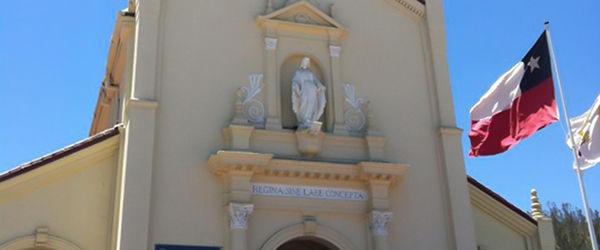“I grew up in the Soviet Union in a time of persecution,” said Archbishop Tadeusz Kondrusiewicz — the first archbishop of Moscow, currently the apostolic administrator of the Diocese of Pinsk in his native Belarus — in a homily during a prayer service with students at St. Paul Catholic High School in Santa Fe Springs on March 13.“Now there is another type of persecution,” he told the crowd of 100 filling the school library. “Secularization, modern relativism.”
But if Catholics live lives that are predicated in Jesus Christ, they can avoid falling prey to these types of persecution, he continued. “Our faith must be a light in our daily life,” he said.
The Archbishop’s visit to the United States was inspired by an invitation to attend the Western Region Canon Law Society Meeting, held March 2-7 in Las Vegas. The second week of his visit was spent visiting different organizations and individuals in Los Angeles, continuing to strengthen bonds between the two archdioceses. (Archbishop Kondrusiewicz hopes to send one of his priests to the International Institute for Theological and Tribunal Studies in Los Angeles this summer.)
It is an altogether different world than that of his youth.
Born into an ethnic Polish family in a village in eastern Belarus in 1946, the archbishop grew up in a war-torn country with a long history of religious persecution during which clergy were slaughtered, worshipers were forced to convert, and many churches were destroyed.
As a 16-year-old, the future priest entered the Department of Physics and Mathematics at a teachers’ training college in his homeland — but had to leave after only a year because of “unpleasant voices” complaining about him being “a believer.”
In 1964 he entered the Leningrad Polytechnical Institute in Russia, graduating as a mechanical engineer in 1970. Oddly, though some people knew he was a practicing Catholic, in Leningrad — now St. Petersburg --- he did not experience the persecution he suffered while at college in Belarus.
At that time, it was state policy for post-graduate students to spend five years working in a location selected by the government; the future archbishop was sent to Vilnius, the capital of overwhelmingly Catholic Lithuania where, for the first time in his life, he grew accustomed to seeing churches staffed by clergy.
“In Vilnius, there were 10 churches and 15 priests,” he recalled. “It was incredible.”
In Lithuania there was also a Catholic seminary. At age 30, he entered it.
Good timesIn 1989, just a few months before the fall of the Berlin Wall, then-Father Kondrusiewicz was ordained a bishop and appointed the apostolic administrator of Minsk, Belarus.
“That was a very good time,” he said, “a time of big political changes. There were new policies, new openness.”
During his two years in Belarus, he opened 97 churches and a seminary. In 1991 — the year the Soviet Union collapsed and Belarus became an independent republic — he was appointed the apostolic administrator of European Russia (a territory of about 4 million square kilometers). Was he disappointed to be called away from his homeland? He brushed the question aside.
“I’m a soldier,” he said, with his trademark combination of earnestness and good humor, in an interview following the prayer service. “My general is saying to me to go, [so I go].”
When he arrived, Moscow was home to about 10 Catholic parishes, and hardly more than a handful of priests. When he left Russia 16 years later — having been appointed, in the meantime, the first archbishop of Moscow — there were 270 Catholic parishes, 150 priests and 400 monks. Six hundred books of Catholic thought and teaching had been published.
Now the archbishop has been back in Belarus for nearly five years — first as archbishop of Minsk (the see has now been re-named the Archdiocese of Minsk-Mohilev), and, since 2011, as the apostolic administrator of Pinsk. And they have been “very good times,” he said, both for the people and for the Church.
Catholic programming airs weekly on national radio and national television. With the permission of the government, Catholics consult with pregnant women who are considering aborting their unborn babies. The government even gives the Church land to build on; in Minsk alone, the Church has received eight pieces of land at no cost.
The youth of Belarus are particularly fervent in their practice of the faith, conducting pilgrimages not only to holy sites in Belarus and Eastern Europe, but also to Rome and the Holy Land. The challenge they pose to Archbishop Kondrusiewicz is that there are not enough churches to serve them, nor enough priests to staff them.
That being said, vocations are growing. Eighty seminarians are studying in the two diocesan seminaries, and another 40 seminarians are studying with religious orders. “I would like to have more,” the archbishop admitted dryly, “but compared to other countries, it’s not so bad.”
The U.S. Conference of Catholic Bishops’ Collection for Aid to the Church in Central and Eastern Europe is very helpful, he added, as he and his brother bishops continue to rebuild the Church that was so wounded over the course of many decades of war and repression.
“The Church is still alive in Belarus,” said Archbishop Kondrusiewicz. “Not just alive, but developing dynamically.”
{gallery width=100 height=100}gallery/2012/0323/belarus/{/gallery}

